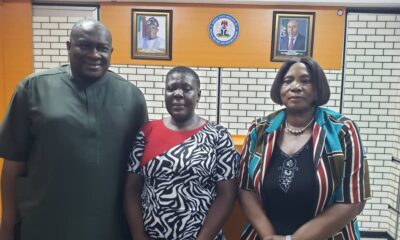Business
Agric Sector Records N1.7tn Trade Deficit In Nine Months

The agricultural sector recorded a trade deficit of N1.7tn between January and September this year, as exports stood at N371.8bn while imports rose to N2.1tn.
This is contained in the latest National Bureau of Statistics’ (NBS) foreign trade report.
The report showed that the total value of trading in agricultural goods during the first three quarters of 2021 was N2.4tn.
In the first quarter of the year, the total trade in the sector was N757.4bn, comprising an export component of N127.2bn and imports worth N630.2bn.
The difference between the value of exports and imports during the reviewed quarter resulted in a trade deficit of N503bn.
The report read in part, “Top exported agricultural products were Sesamum seeds exported mainly to China (valued at N23.1bn), Japan (N8.3bn) and Turkey (N3bn).
“This was followed by good fermented cocoa beans exported to the Netherlands (N9.2bn), Malaysia (N5.5bn) and the United States (N3.2bn). Other major exports under this sector include cashew nuts in shell exported to Vietnam and India, worth N5.3bn and N5.1bn, respectively.
“On the other hand, the import bill in the agricultural sector was dominated by the importation of durum wheat (not in seed) worth (N66.97bn) from Lithuania and Latvia (N41.51bn), as well as Canada (N41.31bn).
“Edible mixtures or preparation of animal worth N82.86bn was also imported from Denmark and Herrings (Clupea haregus, Clupea pallasii) from Russia (N15.8bn) and Netherlands (14bn)”.
However, in the second quarter of the year, the export of agricultural products grew to N165.27bn and the import to N652.08bn, bringing total trade to N817.5bn. Trade deficit in the sector dropped to N486.81bn in Q2.
The NBS data showed that the top exported agricultural products during the review period were fermented cocoa beans exported mainly to Netherlands (N16.4bn), Malaysia (N9.3bn) and United States (N8.4bn), followed by cashew nuts exported to Vietnam (N33.54bn) and India (N3.24bn).
Sesamum seeds were also exported to Japan in the value worth N7.28bn, and China (N7.14bn).
Durum wheat, blue whiting, mackerel, malt, and crude palm oil were some of the most imported agricultural goods in the second quarter, according to the report.
In the third quarter of the year, the report showed that export of agricultural products reduced drastically to N79.4bn, while imports rose significantly to N789.1bn, resulting in a trade deficit of N709.7bn.
“The total value of trade in agricultural goods in Q3 2021 stood at N868.5bn; these comprised agricultural goods exports (N79.4bn) and agricultural goods imports (N789.1bn).
“Agricultural goods exports value in Q3, 2021 was 5.9 per cent lower than Q2 2021 but 31 per cent higher than Q3 2020. The value of imported agricultural goods was 21.01 per cent higher than the value recorded in Q2, 2021 and 56.74 per cent higher than Q3 2020,” the NBS said.
Business
Expert Tasks Government On Civil Maritime Security Unit
Business
Bayelsa Recommits To Infrastructure, Sectoral Dev … Rakes In N227.185b From IGR
Business
NDYC Seeks NDDC Commercialisation … Uncompleted Projects Completion
-

 News1 day ago
News1 day agoNigeria Strengthens Economic Ties With Germany To Boost Investment, Jobs
-

 Featured23 hours ago
Featured23 hours agoFubara Flags Off Upgrading Of 135 Primary Healthcare Facilities In Rivers
-
Rivers24 hours ago
Bonny Protest Neglect, Seeks CSR MoU Implementation
-
Nation22 hours ago
FG Begins Tolling On Abuja-Keffi-Akwanga-Makurdi Highway
-
Business24 hours ago
NDYC Seeks NDDC Commercialisation … Uncompleted Projects Completion
-

 Rivers1 day ago
Rivers1 day agoCommissioner Promises Improved Working Conditions … Splashes N.1m On Outstanding Caregiver
-
Sports23 hours ago
Sports: 2nd Edition Of Inter-Tribal Tourney Kick-starts In Mbiama
-
Niger Delta24 hours ago
NACAT Inaugurates South-South Office In A’Ibom Against Corruption

